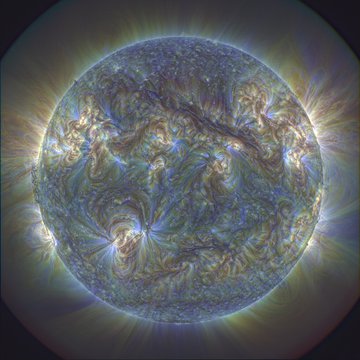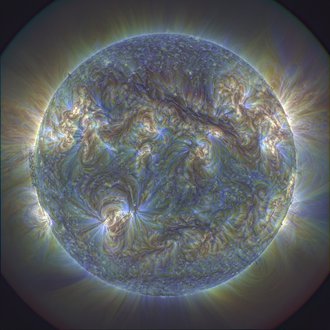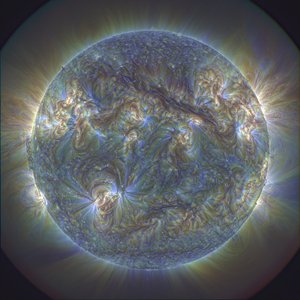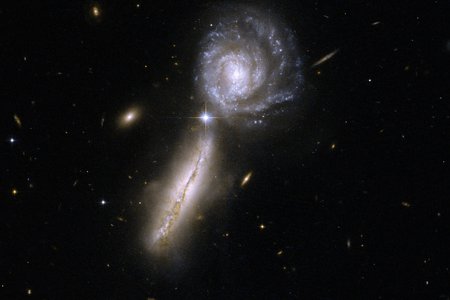Virtual lecture: Babelsberg Starry Night on 15 February 2024

Composite image observed with SDO. A long giant filament (dark blue) below the Sun's north pole covers more than 600,000 km on the solar surface.
Credit: NASA/SDO/A. DierckeThe next talk of the Virtual Babelsberg Starry Nights of the Leibniz Institute for Astrophysics Potsdam (AIP) on the topic "The Sun as chronometer of physical processes" (German) will be broadcast on the YouTube channel “Urknall, Weltall und das Leben” (Big Bang, Universe and Life) from Thursday, 15 February 2024.
On Thursday at 8 pm, the lecture by apl. Prof. Dr. Carsten Denker on "The sun as a chronometer of physical processes" from the Babelsberg Starry Nights series will be online. The processes of the sun are subject to different time scales: While the evolution of the sun spans billions of years, the sunspot cycle lasts only 11 years and eruptions on the surface of the sun occur within a few hours or even just seconds. In his lecture, Carsten Denker presents these and more solar phenomena and explains modern observation instruments that are used to study the sun and deepen our physical understanding of our nearest star.
Usually on the 3rd Thursday of each month, starting at 8 p.m., the lectures of the Babelsberg Starry Nights are available at
https://www.aip.de/babelsberger-sternennaechte
or via the YouTube channels "Urknall, Weltall und das Leben" (Big Bang, Universe and Life) and "videowissen" and can be viewed afterwards at any time.

Composite image observed with SDO. A long giant filament (dark blue) below the Sun's north pole covers more than 600,000 km on the solar surface.
Credit: NASA/SDO/A. DierckeThe next talk of the Virtual Babelsberg Starry Nights of the Leibniz Institute for Astrophysics Potsdam (AIP) on the topic "The Sun as chronometer of physical processes" (German) will be broadcast on the YouTube channel “Urknall, Weltall und das Leben” (Big Bang, Universe and Life) from Thursday, 15 February 2024.
On Thursday at 8 pm, the lecture by apl. Prof. Dr. Carsten Denker on "The sun as a chronometer of physical processes" from the Babelsberg Starry Nights series will be online. The processes of the sun are subject to different time scales: While the evolution of the sun spans billions of years, the sunspot cycle lasts only 11 years and eruptions on the surface of the sun occur within a few hours or even just seconds. In his lecture, Carsten Denker presents these and more solar phenomena and explains modern observation instruments that are used to study the sun and deepen our physical understanding of our nearest star.
Usually on the 3rd Thursday of each month, starting at 8 p.m., the lectures of the Babelsberg Starry Nights are available at
https://www.aip.de/babelsberger-sternennaechte
or via the YouTube channels "Urknall, Weltall und das Leben" (Big Bang, Universe and Life) and "videowissen" and can be viewed afterwards at any time.
Images
Composite image observed with SDO. A long giant filament (dark blue) below the Sun's north pole covers more than 600,000 km on the solar surface.
Big screen size [1000 x 1000, 180 KB]
Original size [4096 x 4096, 4.0 MB]



